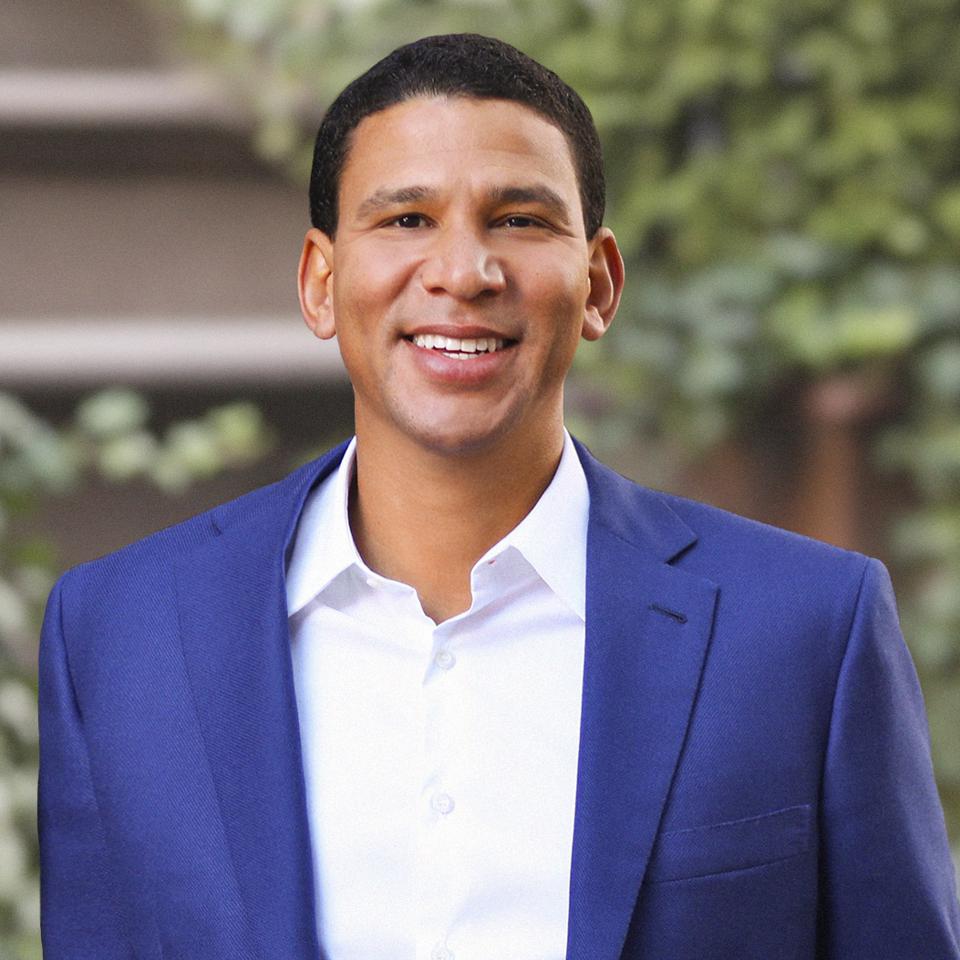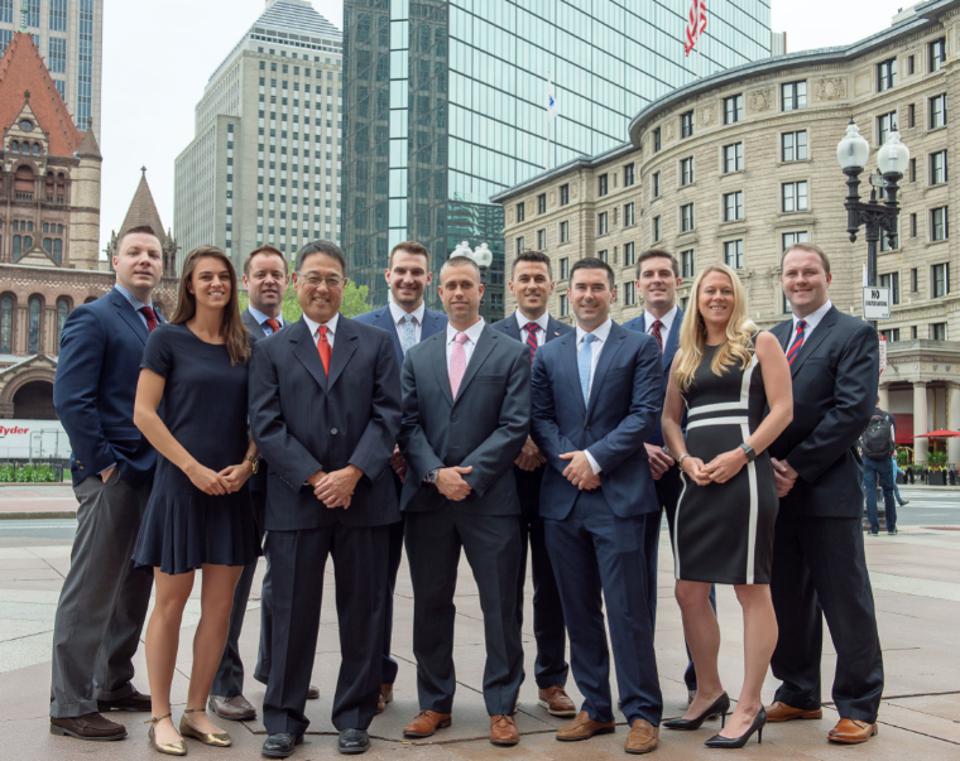
Harness Wealth founders David Snider and Katie Prentke English serve as CEO and CMO, respectively.
Harness Wealth
Adam and Ashley Edrington were in the process of merging their money after getting married when they went looking for an advisor to help them set up a financial plan. Edrington, a 35-year-old operations professional who now works at Singapore Sovereign Wealth Fund-subsidiary Kepler FI and Ashley, 37, a self-employed marketing consultant live in New York City and are expecting twins in June.
Having equity from his previous employer and having liquidated his wife’s equity from a healthcare startup where she worked in marketing, Adam thought he and Ashley would make good potential clients. They weren’t members of the 1%, but they were young professionals with an increasingly complex financial picture.
Despite those credentials, they struggled to find a financial advisor. “It was a situation where I wanted to say ‘just take my money’ and couldn’t find anyone to do so,” Adam adds. “We’re certainly not at the upper echelon but we’re not just starting out. We thought it would be a much easier process to find people that were qualified, thoughtful, and had proper bedside manner to make us feel comfortable.”
They had heard of Harness Wealth from colleagues but not reached out to the company. After the “miserable” experience of trying to find a financial advisor themselves they reached out to the New York-based fintech startup. Founded in 2018, Harness Wealth bills itself as a matchmaker between investors and advisors, specifically catering to young clients who are aging into a better fiscal position but who lack relationships in financial services.

Adam and Ashley Edrington found their wealth advisors at Boston-based Claro Advisors by using Harness Wealth.
Adam Edrington
Adam and Ashley Edrington were the typical Harness customers. One of the first 100 hires at real estate firm Compass, he has equity in the company despite leaving prior to a planned IPO this year. Ashley had been paid out on equity of her own from her time working in marketing for Flatiron Health when the startup was bought by biotech giant Roche in 2018. She is a partner at a marketing consultancy for startups, Noted Marketing.
The couple expects a liquidity event from the impending Compass IPO and wanted to “have their ducks in a row” ahead of time. Through Harness, they had meetings with several advisors and ended up with Claro Advisors, a Boston-based registered investment advisor with $423 million in assets under management.
Harness was founded by a former colleague of Edrington’s, former Compass CFO and COO David Snider, 35, along with Katie Prentke English, 40, who previously served as CMO at London-based online investment manager Nutmeg.
Edrington’s experience comes after a good year for Harness. Powered by a bull market for financial advice and IPOs, Harness saw client and advisor meetings up 848% year over year in the third quarter of 2020 and interest from individuals going through liquidity events increased ten fold in September and October as compared to the previous two months. This came with a backdrop of an IPO boom in 2020 partially powered by SPACs that helped bring along 494 IPOs, more than double the previous year, according to FactSet. Many of the big names to go public were the pool from which Harness found clients including Compass, DoorDash, Opendoor, AirBnB, Snowflake, Affirm, and Segment. Harness makes money by charging advisors a cut of the fee they end up charging clients that are referred via their service.

Robert Reffkin is the founder and CEO of Compass. The company recently filed for an IPO with $3.7 billion in revenue last year, a 56% surge over 2019.
Compass
English, who serves as chief marketing officer, says she and Snider noticed that individuals with complexity in their finances, specifically those who experience sudden changes in their net worth from liquidity events, had trouble finding financial advisors. Harness mostly partners with independent RIAs, though they have a few teams from larger institutions including First Republic Bank on the platform. They not only pair with clients to recommend advisors but also to recommend what solutions they need, sometimes working with a client to find a financial planner and separately to find a tax firm. Harness’s ongoing revenue share with advisors on the platform means clients do not pay for the service.
The advisor evaluation process involves categorizing firms on size, digital usage and other differentiators. They only work with advisors with at least 15 years of experience with a preference for those with advanced degrees in business, law or taxation and special certifications in financial planning, financial analysis and public accounting, among others. They ensure that firms have clean records with the Securities and Exchange Commission, ensure they are fiduciaries, and use the Financial Industry Regulatory Authority Brokercheck system to further investigate. They require firms to custody with Charles Schwab, TD Ameritrade, Fidelity, Bank of New York Mellon, Raymond James, or BNY Mellon Pershing and only work with fee-only advisors. The extensive requirements also include: that advisors charge at or below standard industry fees, roughly around 1.5%; a minimum of $300 million in assets under management; a minimum of three partners and 10 staff; acceptance of clients with 250,000 to $25 million in investable assets; an in-house investment team; financial planning and tax loss harvesting services; a client portal; and no recent data breaches.
They also factor in diversity of leadership, advisors and staff, boasting a higher percentage of female advisors than the industry average and also looking for other types of diversity as well as international backgrounds and foreign language capabilities. Advisors on the platform are interviewed a minimum of five times and screened for over 120 attributes. Those upfront evaluations are followed up with annual “re-audits” and ongoing client feedback.

Boston-based Claro Advisors are among the more than 1000 advisory firms on the Harness Wealth platform.
Claro Advisors
When it comes to pairing those advisors with clients they analyze a client’s personal and financial events, income, assets, goals and preferences.
English says advisors are happy to share the revenue in order to save time and money on marketing, freeing up resources to manage money and advise clients.
Jennifer Street, who serves as chief operating officer and chief compliance officer at the aforementioned Claro Advisors, says that the Harness model, where advisors offer compensation for referrals, is seen as a marketing expense. In the past this prospecting has been handled by several different parties from outside marketing agencies to junior staffers to subscription-based lead generation services.
In Street’s experience, Harness has been worth their share of the advisor fee, with prospect conversations being productive, saving them time getting in front of potential clients. Additionally, for what she describes as a “concierge-level matchmaker” the referral fees have been consistent with averages, chalking it up to the “cost of doing business.”
Paying for lead generation has long been a stalwart of the wealth management industry. Typically the number one source of these types of referrals, according to Street, are attorneys or accountants who have a relationship with the investor.
“If you talk to any advisor they want to spend their time working with their clients and managing money,” English says. “This enables them to partner with someone like us so that they can focus on the things they care the most about and that they’re best at.”
Harness has more than 1,000 advisors on its platform, specifically looking for firms that have good digital capabilities, ESG investing options and experience working with those experiencing liquidity events to cater to the types of customer they attract. English says that most of Harness’s clients range from late 20s to 40s having specifically built a large customer base in the world of technology startups. This generation has seen an influx of capital from the IPO market. Additionally, English says that today’s startups are offering a larger population of employees equity, upwards of 60% to 90% of staff, creating a larger population in need of financial advice.
As panic took over the markets last March with the specter of Covid-19 and its impact on the economy causing a sharp drop in the stock market, a software engineer from Seattle found himself worried about what this meant for his personal finances and without a financial advisor.
One of the first 40 employees at fintech giant Stripe in 2013 he holds equity as the company is bandied about as perhaps the largest impending IPO for 2021 despite leaving the San Francisco-based financial services unicorn in 2018.
He always thought that he would seek financial advice once he stood to profit from that equity when the company went public, but as fear gripped the market with a pandemic on the rise, he felt compelled to have his wealth managed professionally.
Having not had any exposure to this world, a Google search brought up Harness. That developer ended up paired with a San Francisco bay area based RIA with more than 130 clients and $3.5 billion in assets that caters to Silicon Valley professionals.
